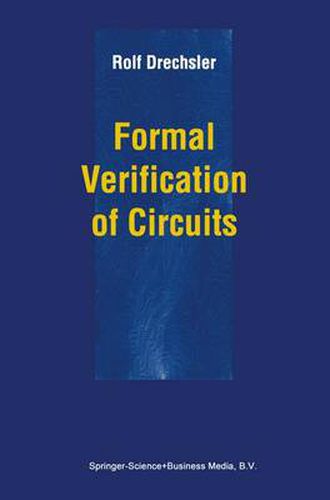Readings Newsletter
Become a Readings Member to make your shopping experience even easier.
Sign in or sign up for free!
You’re not far away from qualifying for FREE standard shipping within Australia
You’ve qualified for FREE standard shipping within Australia
The cart is loading…






This title is printed to order. This book may have been self-published. If so, we cannot guarantee the quality of the content. In the main most books will have gone through the editing process however some may not. We therefore suggest that you be aware of this before ordering this book. If in doubt check either the author or publisher’s details as we are unable to accept any returns unless they are faulty. Please contact us if you have any questions.
Formal verification has become one of the most important steps in circuit design. Since circuits can contain several million transistors, verification of such large designs becomes more and more difficult. Pure simulation cannot guarantee the correct behavior and exhaustive simulation is often impossible. However, many designs, like ALUs, have very regular structures that can be easily described at a higher level of abstraction. For example, describing (and verifying) an integer multiplier at the bit-level is very difficult, while the verification becomes easy when the outputs are grouped to build a bit-string. Recently, several approaches for formal circuit verification have been proposed that make use of these regularities. These approaches are based on Word-Level Decision Diagrams (WLDDs) which are graph-based representations of functions (similar to BDDs) that allow for the representation of functions with a Boolean range and an integer domain. Formal Verification of Circuits is devoted to the discussion of recent developments in the field of decision diagram-based formal verification. Firstly, different types of decision diagrams (including WLDDs) are introduced and theoretical properties are discussed that give further insight into the data structure. Secondly, implementation and minimization concepts are presented. Applications to arithmetic circuit verification and verification of designs specified by hardware description languages are described to show how WLDDs work in practice. Formal Verification of Circuits is intended for CAD developers and researchers as well as designers using modern verification tools. It will help people working with formal verification (in industry or academia) to keep informed about recent developments in this area.
$9.00 standard shipping within Australia
FREE standard shipping within Australia for orders over $100.00
Express & International shipping calculated at checkout
This title is printed to order. This book may have been self-published. If so, we cannot guarantee the quality of the content. In the main most books will have gone through the editing process however some may not. We therefore suggest that you be aware of this before ordering this book. If in doubt check either the author or publisher’s details as we are unable to accept any returns unless they are faulty. Please contact us if you have any questions.
Formal verification has become one of the most important steps in circuit design. Since circuits can contain several million transistors, verification of such large designs becomes more and more difficult. Pure simulation cannot guarantee the correct behavior and exhaustive simulation is often impossible. However, many designs, like ALUs, have very regular structures that can be easily described at a higher level of abstraction. For example, describing (and verifying) an integer multiplier at the bit-level is very difficult, while the verification becomes easy when the outputs are grouped to build a bit-string. Recently, several approaches for formal circuit verification have been proposed that make use of these regularities. These approaches are based on Word-Level Decision Diagrams (WLDDs) which are graph-based representations of functions (similar to BDDs) that allow for the representation of functions with a Boolean range and an integer domain. Formal Verification of Circuits is devoted to the discussion of recent developments in the field of decision diagram-based formal verification. Firstly, different types of decision diagrams (including WLDDs) are introduced and theoretical properties are discussed that give further insight into the data structure. Secondly, implementation and minimization concepts are presented. Applications to arithmetic circuit verification and verification of designs specified by hardware description languages are described to show how WLDDs work in practice. Formal Verification of Circuits is intended for CAD developers and researchers as well as designers using modern verification tools. It will help people working with formal verification (in industry or academia) to keep informed about recent developments in this area.